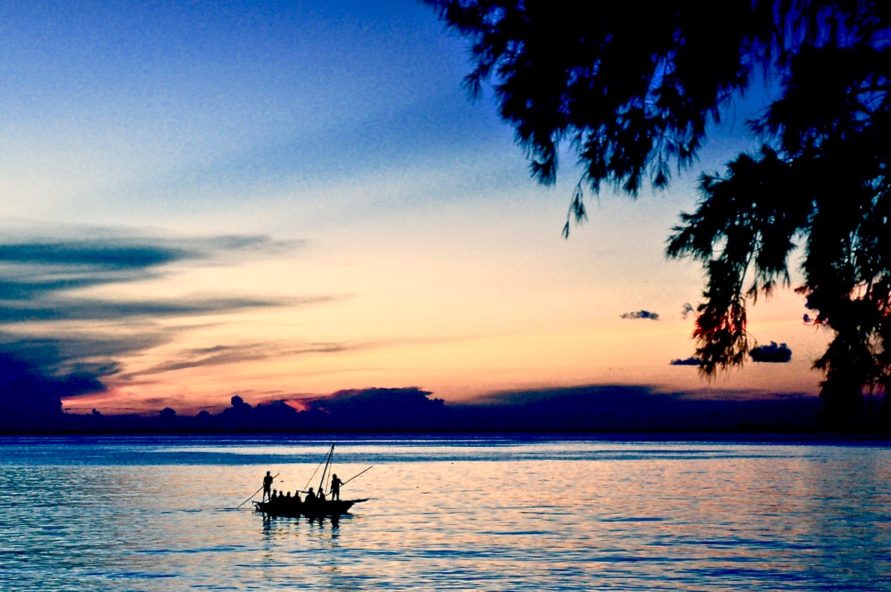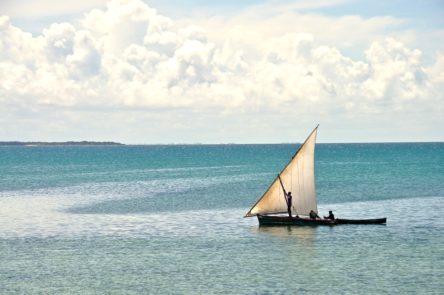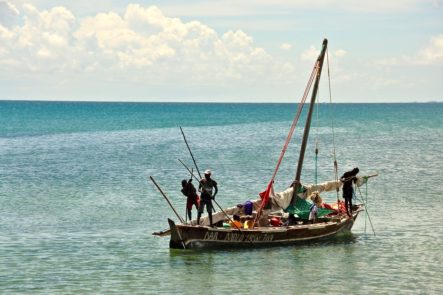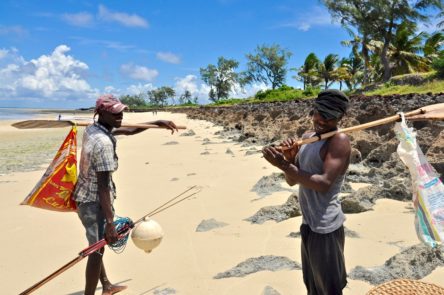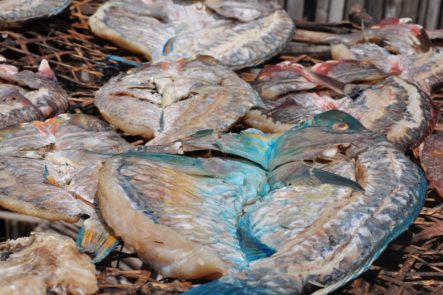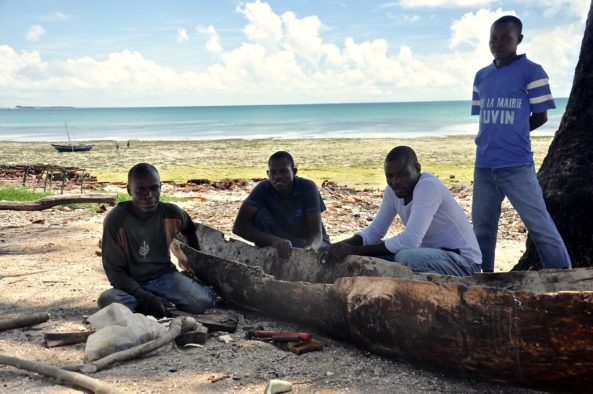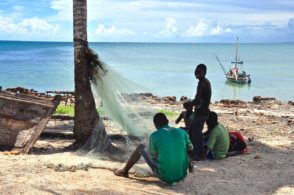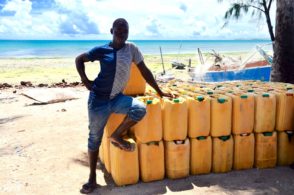It’s 5 in the morning, a tiny ray of sunlight on the horizon is heralding the day that is just starting. However, Juma, a local fisherman, hasn’t slept for the last few hours. He has been fishing in the moonlight, using a torch to attract fish. When he heads back towards Quifuki Island in the break of dawn, the small town, his temporary home, is bustling with life already. The mosque is calling for prayer, women are lighting charcoal fires and bathing their children.
The day starts early here as everybody is eager to savour the refreshingly cool morning air. Mozambique uses the same time-zone as its main economic partner, South Africa, but in terms of longitude East Africa Time would make more sense, especially here up north, and as a result it can start getting unbearably hot in the sun as early as 6am.
As it gets brighter Quifuki’s partly rocky, partly sandy coast presents a beautifully stark contrast to the brilliantly turquoise surrounding waters of the Western Indian Ocean. This island is built on coral rock and located about 10 km off the east coast of the Cabo Delgado province in Mozambique. I am here to meet the local fishermen community in my capacity as BV’s Mobile Fisheries Monitoring Coordinator in the Our Sea Our Life project. As such, my first month in Mozambique was very much about understanding local needs and interest in monitoring their marine resources.
On the rocky shore I watch Asani and his colleagues as they eagerly wait for the night fishermen’s arrival. Asani is a fish trader who came all the way from Mtwara, Tanzania – a one day trip sailing in a Dhow, the traditional means of transport in East Africa’s swahili coast. He spends a month at a time on Quifuki, before returning home to sell the high quality dried fish he has accumulated here. Suddenly, as the fishermen arrive the air is filled with agitated haggling, offers are made, weighing scales are used to agree the value of the catch, and once the deal is concluded money changes hands.
Meanwhile, Juma has a big smile on his face despite his tiredness. He was lucky today, he caught some big parrotfish and groupers with his speargun and got a good price for them. He hasn’t seen fish this size for a while back home in the heavily exploited waters of Nampula, the more densely populated province south of Cabo Delgado. While the traders are preparing the fish to dry in the sun he enjoys some deliciously crispy chapati, dipping it into sweet bean stew and sipping steaming chai whilst chatting away with other fishermen, sharing their experiences and stories from last night. Most of them are, just like himself and Asani, not natives of the Cabo Delgado province but regularly come here from Tanzania or from more southern areas of Mozambique.
Like many of the islands in this area, Quifuki is dominated by migrant fishermen and traders, who make up over 90% of the population. This turns the maze of little pathways between the makeshift huts into centres of cultural exchange: people haggle in Makua, one of the many local dialects, there are discussions over a game of bao, a traditional Swahili board game, in Kiswahili, chatting in Kimwani, praying in Arabic, and school lessons taught in Portuguese.
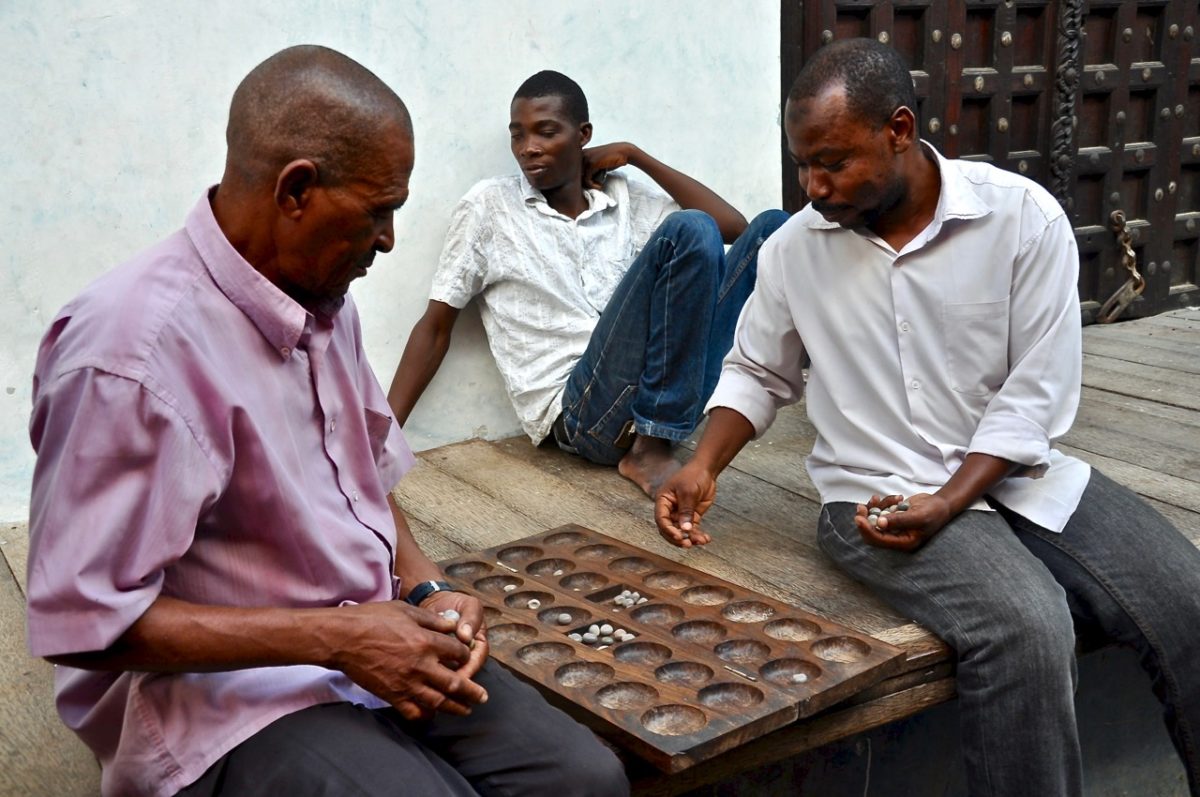
Bao players in Stone Town, Zanzibar, where Bao societies like the Chama cha Bao even hold official tournaments!
The majority of the inhabitants of this island stay for a few months before returning home, but many come back for another fishing season or have moved their whole family over and made a permanent home on the island. One of these long-term inhabitants is Lider Momade Baidade, who arrived in Quifuki as a cowrie trader about 10 years ago from Memba. Now he is not only the community’s chief, but also a member of the local Conselho Comunitário de Pesca (CCP, Community Fishing Council), that is currently setting up a Locally Managed Marine Reserve with the support of AMA, a local environmental organisation, in the framework of the Our Sea Our Life project. As he is fluent in Portuguese, Makua and Kiswahili, it is impressive to watch him as he translates for CCP members of different backgrounds during their regular meetings.
Later, in the tranquillity of the midday heat, Juma has a snooze in the shade, getting a well-deserved rest to recharge his batteries before going out fishing again in the afternoon. The only things working happily at this time of day are the numerous solar panels sizzling in the blazing sun; some diligent fishermen who found a breezy spot in the shade of a Casuarina tree are mending nets or fixing boats, and the women are always busy preparing food, baking bread or selling water. This island does not have a source of freshwater, so trading gallons of water brought over from the mainland is a lucrative business.
I am humbled by the commitment of the people of Quifuki: they are giving up the comfort of home, family support and being around loved ones – even the comfort of freshwater – to make the most of a fishing season in the rich waters around this island. This demonstrates how great the appeal of fishing here is: the catch benefit and the profit they bring home to their family outweighing the temporary sacrifice of comfort.
The Our Sea Our Life project is funded by the European Union, Darwin Initiative and Fondation Ensemble.
Find out more about our work supporting partners


